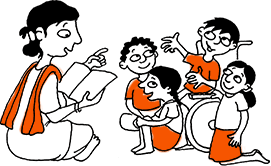AVEHI ABACUS PROJECT aims at empowering children to develop a comprehensive view of the world, beginning with their immediate reality. To appreciate the possibilities and limitations of AAP, it is necessary to locate it in the context of current educational beliefs and practices.
At one end of the spectrum we have a majority of schools adopting the conservative approach - this approach accepts the traditional role played by the school, that of endorsing the established order. Under this approach the curriculum promotes certain values, stereotypes, and worldviews. It demarcates specific subject areas, and in the process defines what constitutes valid knowledge, suggesting that it is in some way separate from everyday life. Also the relationships that the school and the classroom situation perpetuate are those of hierarchy and authority.
At the other end of the spectrum are approaches claiming to be innovative that view the school as a self-contained unit disconnected from its surroundings. Under this approach, the effort is usually focused on improving learning strategies and methodology.
Where does AAP fit in, in relation to the above? AAP recognizes the conservative role played by the educational system in society. At the same time, we believe that there is space within the present system for exploration of alternatives.
Without creating a parallel structure outside the school system or trying to completely reject it, AAP adopts a syncretic approach, drawing on elements from varied progressive educational philosophies. We seek to establish a space within the school system, but outside the rigid syllabus where alternative curricular and pedagogical strategies can be explored.
There are therefore greater possibilities in terms of replication than the parallel structure approach and greater freedom to innovate than the curriculum reform approach.
We believe that
- Learning is best conceived as a process, not in terms of outcomes.
- It is a continuous process, grounded in experience.
- Learning is a holistic process of adaptation to the world.
- Learning involves an understanding of the give-and-take between the person and the environment.
- Learning implies knowledge acquired as a result of the interaction between social and personal experience; therefore, underlying all this are value systems.
Our work is based on the understanding that education does not function in a vacuum. It exists for a purpose – one that is determined by society. What is this purpose and how can it be best achieved? What is the role of the schoolteacher in this process? These are important questions for any society – and even more so for a society like ours that is so diverse and complex, which is among the world’s fastest-growing economies and yet is unable to meet the challenge of fulfilling even the most fundamental needs of a majority of its people.
We have therefore attempted to provide teachers and children with a way of thinking, of looking at and interpreting the world. The idea is to enable the child to see the connections between
- everyday experience and what is learnt formally in school
- apparently disparate subject areas, like physics and history for example
- the world of nature and the various cultures that have developed around the world
The aim is to equip the child with an outlook and a method of analysis – a tool – which will help her/him grow up as a thinking, concerned human being. The focus is on developing children’s skills of thinking, analysing and making choices; and on inculcating the values and habits of mind that will enable them cope with the daily reality of their lives and to live and work with others in a spirit of understanding and harmony.

